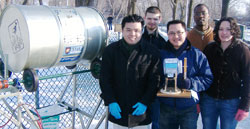Engineers go to the dogs for park
Daniel Bartlett

Mechanical Engineering students (from left) Phuong Thanh Tran, Steven Detic, Du Cuong Tram, MBangiwa Simon and Celine Primeau demonstrate both their original model for a dog waste composter, and the final product. The composter will be installed at a park in NDG this spring.
Daniel Bartlett
Five Concordia students in the Mechanical Engineering Depart-ment have built a dog waste composter that will be installed in NDG Park this April. If effective, the students’ prototype will be evaluated by the city and may be installed in other Montreal parks over time.
As part of their capstone project, group members Phuong Thanh Tran, Du Cuong Tram, MBangiwa Simon, Céline Primeau and Steven Detic decided to design a dog waste compost machine at the request of the NDG Dog Run Association. The capstone project is a yearlong assignment whereby students take the knowledge they’ve learned in class and work together to create something innovative.
“At first when we started designing the composter, we had four drawings, four types of composters,” Tran said. “We chose the one that cost the least and was the most efficient.”
For the project, each group is given a $500 budget by their department. However, seeing as their initiative involved an outside interest, Tran and his group partners received their $500 from the NDG Dog Run Association and were also sponsored by Sermatech International. This allowed the group to build a prototype for $498.
Group supervisor Henry Hong said that since the five students made an extra effort to work in conjunction with the NDG association, their project was given the time and effort needed to create a superior product.
“We don’t hold their hands at this point,” Hong said. “This group is very independent.”
For dog run committee member Jim Fares, the idea to ask students to build a new composter for NDG Park came after he spoke with Judith Patterson, a Concordia professor in Geography, Planning and Environment Department. “The professor at Concordia said, ‘I know that there’s a thing called the capstone project,’ and she knows Professor Henry Hong,” he said. “So she went to him and said, ‘Is this something that can possibly work?’ and he said ‘Yes, absolutely, submit it.’ So we submitted it, and the rest, as they say, is history.”
With nine stationary bins currently placed in NDG Park, Fares said the six-member association would have trouble composting dog waste because rocks had to be continually sifted manually. This, along with having to manually mix the waste, caused the previous bins to be very unmanageable.
Now, Tran said his group’s new prototype gives the option to manually or automatically mix the waste while rocks filter out mechanically. He also said the new machine will work twice as fast as the current stationary bins, with the composting process taking three months instead of six.
“It’s a good project because it has ultimately a good purpose in the environmental sense and there’s nothing more top of mind than that these days,” Fares said.
“[The group has] obviously taken it very seriously. They’re way ahead of everybody who has other projects, and they seem excited by it, too. I think they’re very happy with what they’ve done.”
